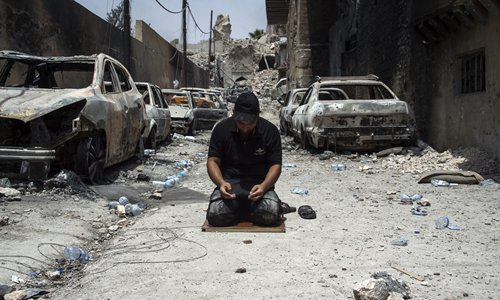HOME >> OPINION
Geopolitics behind US paring anti-terror steps
By He Wenping Source:Global Times Published: 2019/12/29 19:39:38

A photo taken in 2017 shows an Iraqi Counter-Terrorism Services member prays in the Old City of Mosul during an offensive to retake the city from Islamic State group fighters. Photo: AFP
The US Department of Defense is looking into "a major reduction - or even a complete pullout - of American forces from West Africa," as part of its "reviewing global deployments," according to a New York Times report on December 24. Concrete measures include "abandoning a recently built $110 million drone base in Niger" and "ending assistance to French forces battling militants in Mali, Niger and Burkina Faso."
If true, the move indicates that Washington is turning its attention from worldwide counter-terrorism measures to competition among major powers. On the other hand, it will be a huge challenge to the already grim counter-terrorism struggle in Africa, especially West Africa.
Since the September 11 attacks in 2001, the US has shifted its foreign strategy to counter-terrorism at the global level, including launching wars in Afghanistan and Iraq in the name of fighting in militancy strongholds. After the "Arab Spring" broke out in 2011, Washington assisted NATO in initiating a war in Libya and supported Syrian opposition forces in fighting government troops in the 8-year-long Syrian civil war.
In nearly two decades of global counter-terrorism operations, US forces have destroyed regimes such as those of Saddam Hussein in Iraq and Muammar al-Gaddafi in Libya, and have killed Al Qaeda's founder Osama bin Laden and the Islamic State leader Abu Bakr al-Baghdadi. The armed power of Islamic State in Iraq and Syria has also been greatly contained.
The Taliban in Afghanistan, which Washington was desperate to wreck, has shown a resurgent tendency. The Islamic State's members have moved to North and West Africa in recent years, and the counter-terrorism struggle in West Africa and Sahel has become increasingly serious. Even so, the Pentagon believes that these terrorists "lack the demonstrated ability and intent to attack the United States on its own soil."
Hence, to support US President Donald Trump's reelection efforts and fulfill his pledge to end what he calls the US "endless wars," withdrawing troops from regions which matter little for US interests has become an inevitable choice.
However, withdrawing US troops from West Africa is not meant to send them back home, but to redeploy them to the locations the Pentagon believes are more significant and demanding, such as Asia and Central and Eastern Europe, which surround China and Russia.
During a news conference in Afghanistan in October, US Defense Secretary Mark Esper said he was asking all his commanders to search areas "where they can free up time, money and manpower to put into our top priorities as chartered by the National Defense Strategy: China, No.1; Russia, No.2."
At the Council on Foreign Relations in New York on December 13, Esper reiterated, "China first and Russia second are now the department's top priorities."
As the Islamic State emerged from the war in Iraq and developed amid the Syrian civil war, terror groups in Africa became active during the Libyan civil war in 2011. After the collapse of Gaddafi's regime, a large number of militants in Libya flew to neighboring countries such as Algeria, Mali, Niger and Mauritania. These terrorist and extremist forces integrated with local anti-government forces, posing a challenge to the regimes and territorial integrity of these countries.
In recent years, North African Al Qaeda in the Islamic Maghreb, Somalia's Al-Shabaab and Nigeria's Boko Haram have begun to work together. Thus, the focus of global counter-jihad movements and anti-terrorist operations has shifted to Africa. After the Islamic State was routed in Iraq and Syria, many of its members started to establish strongholds in Africa, such as Libya, the Sinai Peninsula and even West Africa. The Sahel region has suffered from terrorism for several years.
Take the West African country Burkina Faso as an example. From October 2019, there have been three major terror attacks in this country, killing over 100 civilians. More than half a million people become displaced due to the constant attacks in the northern and eastern areas. In July 2019, United Nations Secretary-General Antonio Guterres made it clear that Africa is becoming the frontline of countering terrorism and violent extremism worldwide.
To deal with the threats of terrorism and extremism, Burkina Faso, Chad, Mali, Mauritania and Niger established the G5 Sahel in 2014, and formed a 5,000-people joint force in 2017. Besides, there are 4,500 French soldiers stationed in West Africa carrying out the counter-terrorist operations on behalf of Western countries, which however heavily rely on intelligence and logistical assistance from the US.
Not long ago, on his visit to several West African countries, Emmanuel Macron, the president of France, vowed to strengthen support for counter-terrorism in Africa. However, its ally, the US, opting-out from the counter-terrorist operations nowadays not only makes France hard to continue on its own, but also poses a huge disadvantage for counter-terrorism in West Africa and even the entire African continent.
The author is a research fellow with the Institute of West-Asian and African Studies, Chinese Academy of Social Sciences, and a senior research fellow with the Charhar Institute. opinion@globaltimes.com.cn
RELATED ARTICLES:
Posted in: VIEWPOINT